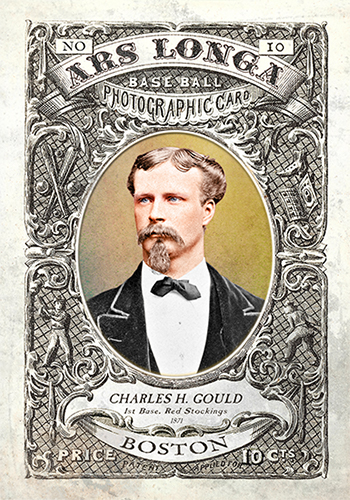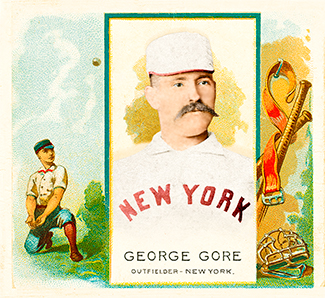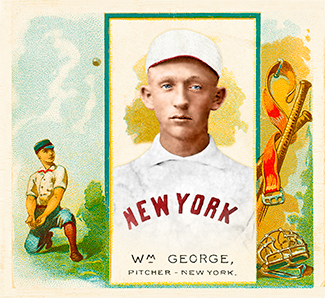- Series: Mort's Reserve
- City: Boston
- Team: Red Stockings (NAPBBP)
- League: National Association (NAPBBP)
Charles Harvey Gould (1847-1917) played for the 1st professional team, the Cincinnati Red Stockings, who reigned supreme for 2 yrs, winning 84 straight games and barnstorming the country from 1869-1870. Disbanded in ’71, Gould followed Harry Wright to Boston where he inaugurated baseball there and won its 1st title in 1872.
- His fielding prowess earned him the nickname “the bushel-basket”
- Ironically, Gould’s errant throw to 2nd ended his Red Stockings’ duel with the Brooklyn Atlantics, and with it the longest winning streak in baseball history on June 14, 1870
- Was Cincinnati Reds’ first manager: 1876
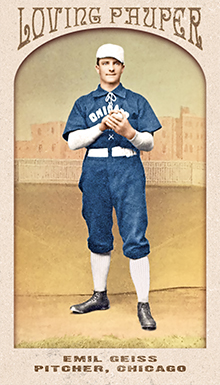
- Series: 1880s: Loving Paupers
- City: Chicago
- Team: White Stockings
- League: National League
Emil Geiss (1865-1911) emigrated from his birthplace, Villmar Germany, to Chicago. The youngster began his experience in professional baseball out in Colorado with the Pueblo Pastimes of the CO State League in 1885. The scanty records for minor league play in those days record Emil started two games, finished them both and went 1-1. There is no data for Geiss’ activities the following year, but one might suppose he did something somewhere to impress the Chicago White Stockings as the National League power thought fit to sign Emil for the ‘87 season. Whatever Cap Anson’s hopes were, they died aborning as Geiss languished with the team. He got shelled in his one start (11 runs, eight earned) and not only left the major leagues, he left his adopted land. Geiss signed the following two seasons with London Ontario Canada’s Tecumsehs of the International Association and stayed for the 1889 campaign when the Tecumsehs joined the International League. In those two years Geiss was 21-21 . But for his sole outing in Chicago, he would have completed his pro tenure with a symmetrical record of 22-22.
- There is no doubt Emil belonged in the pitcher’s box as his hitting gave no indication he could perform anywhere else. He never cracked the .200 mark and was one for 12 with the White Stockings. His three errors in his brief time in the majors suggest it wasn’t just his bat that would be a detriment to longevity at that level
- The reason Geiss had twelve at bats in Chicago is that Anson put him at first base and second base in two other appearances
- Emil’s older brother Bill also saw major league duty, playing two seasons. He debuted with Baltimore in the American Association in 1882 and then joined the Detroit Wolverines of the NL in ‘84
Auction History
Cartophilia
Old Judge Pose: 182-2
- Series: 1888 Champion New York Giants
- City: New York
- Team: Giants
- League: National League
“Piano Legs” (1857-1933). An outfielder for 4 teams over 14 major league seasons, Gore was an excellent hitter who played on 7 pennant winning teams and in 4 World Series. His alcoholism oftentimes put him at odds with teammates, fans, and managers.
- All-time leader in OF errors: 368
- Stole 7 bases in 1 game; a record
- Had 5 extra-base hits in 1 game: a record he achieved by hitting 3 doubles & 2 triples against Old Hoss Radbourn
- Won NL batting title: 1880
- Series: 1888 Champion New York Giants
- City: New York
- Team: Giants
- League: National League
William M. George (1865-1916) was a left-handed pitcher & outfielder for two major league teams over 3 years in the late 1880s. He debuted as a pitcher for the NY Giants in ’87. During his two seasons on the mound, George went 5-10 with a 4.51 ERA. His mediocre performance led to him being released by the Giants in June of ‘89. He had not gotten into a game that year in NY. The native of Bellaire, OH tried out with the American Association’s Columbus Solons in July of 1889. They picked him up as an outfielder. Bill got into five games that summer, getting 4 hits and 3 RBI in 17 at-bats & was released in August, ending his major league experience.
- Bill’s record in ’88 was 2-1 with a 1.34 ERA. But, with Tim Keefe winning 35 with an 1.74 ERA & Mickey Welch winning 26 with a 1.93 ERA, the competition was stiff on the pennant winner
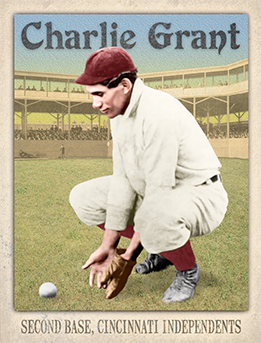
- Series: Diamond Heads '15
- City: Cincinnati
- Team: Stars (IND)
- League: Independent
Charles Grant Jr. (1874-1932) replaced Sol White at second base in 1896 when White left the Page Fence Giants, a move that came back to bite White's Cuban X-Giants later that year when Grant's team won the championship series 10 games to 5. Page Fence folded in '99 and Charlie moved to the Columbia Giants of Chicago. But is wasn't his prowess afield in the early Black leagues that brought Grant to the razor's edge of history. The smooth-fielding youngster worked in a hotel in Hot Springs, AR in the off-seasons where John McGraw's Orioles trained. McGraw, ever-voracious for talent, spied Grant playing pick-up games with co-workers and immediately judged him to be of major league caliber. The color-line was obdurate but McGraw seized on the ploy of passing Grant off as a Native American, even dubbing him “Tokohama” after a name he saw on the hotel's map. The scheme almost worked. Sol White tells the story of how McGraw's efforts to surreptitiously integrate the American League foundered when Baltimore went up to Chicago en route from spring training. Comiskey noticed that Grant's friends in town had shown up to applaud him and even sent a bouquet. Outed, McGraw had to yield to the league's segregation. White shared McGraw's esteem for Grant's ability: “I will give any 'fan' a good ten-cent cigar who will call my attention or, rather, recall my memory to an error on a ground ball or a muffed fly by Charley Grant.” His chance at national fame thwarted, Grant continued a very successful career in Black ball.
- Never a strong hitter, Grant always earned his keep at second. He died tragically, struck by a car that had blown a tire. In death, this great player received a measure of the recognition of which he was deprived by baseball's moguls. He is buried a short distance from Hall of Fame second-sacker Miller Huggins at Spring Grove Cemetery in Cincinnati
